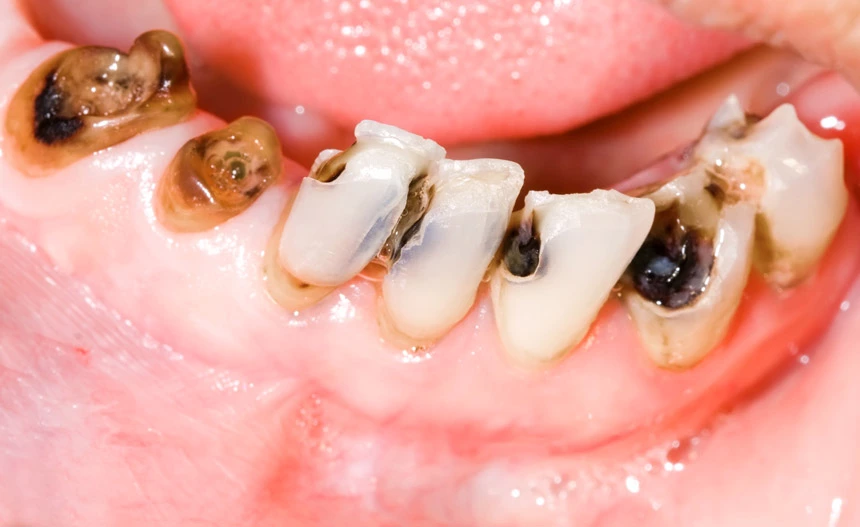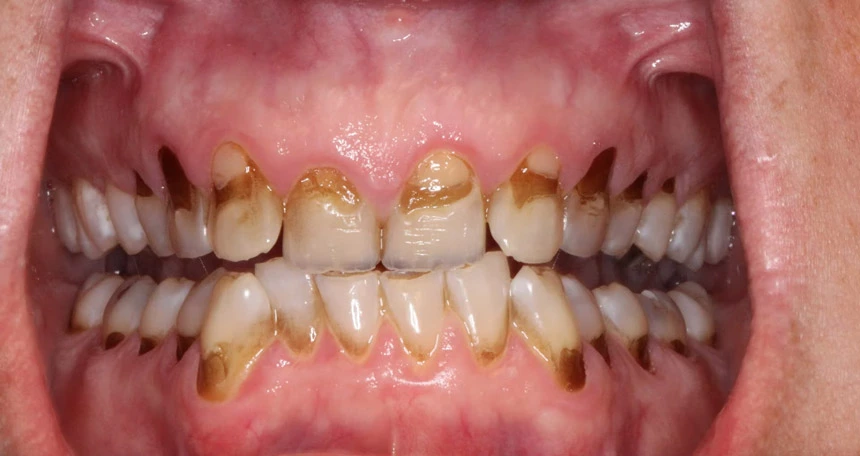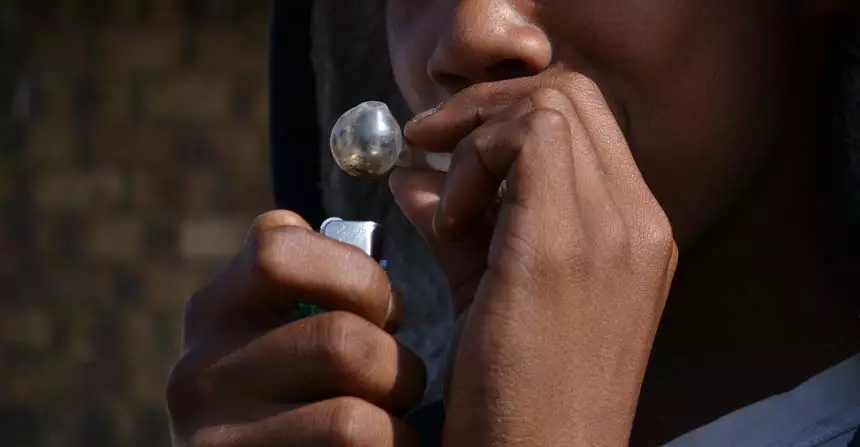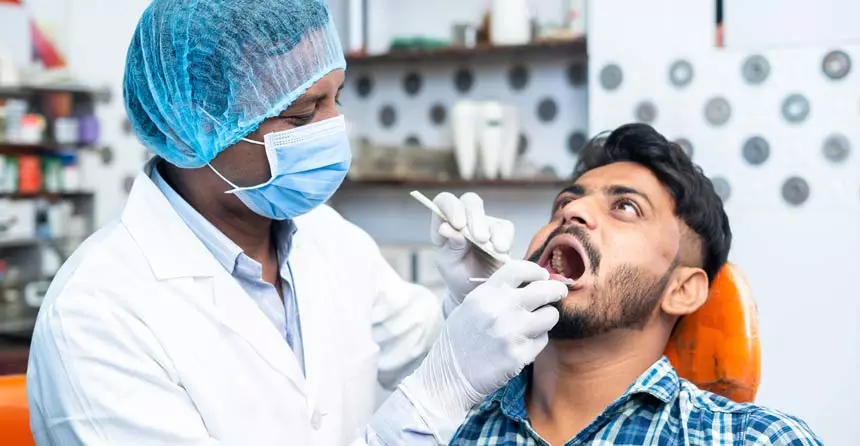6 Key Symptoms of Meth Mouth and How to Heal Your Smile
Table of Contents
Maybe you come from a long line of family members who have a drug abuse history. Perhaps you have started to dabble in methamphetamines yourself — and it appears that your teeth are paying the ultimate price. With 35 million people globally using meth, it should come as no surprise that meth mouth is a common condition.
If you want to learn more about how meth users suffer from this issue with their dental health and how you can find treatment, here are the facts.
What are the Signs of Meth Mouth
The symptoms of meth mouth impact almost every aspect of your oral health, including the appearance of your teeth. However, it can also lead to uncomfortable or painful symptoms if these issues go untreated. Here are some of the top symptoms of meth mouth.
1) Dry Mouth
Saliva plays a key role in oral health, but methamphetamines make it less likely that your body will produce enough. According to the Maine Center for Disease Control and Prevention, substance abuse with meth dries out the salivary glands. Roughly one-third of meth show signs of severe and prolonged ‘cotton mouth,’ another term for dry mouth. It can be quite uncomfortable to have reduced saliva, resulting in the desire to drink more frequently.
Many people who are addicted to methamphetamine will also drink more sugary drinks while under the influence, leading to even more problems for the teeth. Part of the reason is that they require additional water or liquid even for simple actions like swallowing their food.
However, a chronically dry mouth can have a powerful and negative effect on your oral health as well.
Without saliva to protect the teeth, the acidic components found in the mouth will actually eat away at the enamel of the tooth. Meth mouth is characterized by many cavities as a result. It is a contributing factor to why so many people addicted to meth have tooth decay.
2) Tooth Decay
One study proposes that 96 percent of meth users have tooth decay. Oftentimes, this stems from poor oral hygiene. It isn’t uncommon to find that meth users neglect daily living activities like brushing their teeth. According to the Journal of American Dental Association, 53 percent of meth users never brush their teeth or only do so occasionally.
The first signs of tooth decay will start around the gum line before making their way to the rest of the tooth. Frequently, the front teeth are the first to suffer from some of these symptoms of severe tooth decay.
3) Cracked Teeth from Clenching or Grinding
Meth users may start to feel on edge while under the influence of the drug. Whether caused by anxiety or stress, methamphetamine abuse frequently results in teeth grinding or a tightly clenched jaw. Extensive tooth decay is problematic for those with meth addiction, but a more painful experience is possible with cracked teeth.
The clenching of the jaw and the grinding of the teeth (also known as bruxism) can destroy the integrity of the tooth over time. A skilled dentist will be able to note extreme patterns of wear on the teeth.
If you suffer from meth mouth, you might be surprised to learn how quickly the teeth can break. In combination with decay and gum disease, clenching weakens teeth until they crack at the slightest provocation such as while chewing relatively soft foods.
4) Teeth Falling Out
Beyond gum disease, meth mouth includes a much more obvious symptom of substance abuse: missing teeth. The Journal of the American Dental Association found that methamphetamine abuse was positively correlated not only with cavities but with missing teeth compared to those without drug abuse or cigarette smokers.
Thirty-one percent of meth users had six or more missing teeth. Poor oral hygiene combines with dry mouth, cavities, and cracked teeth and results in meth mouth — which often leads to those teeth falling out of the mouth entirely.
5) Swollen Gums
Maybe your teeth are starting to be overshadowed by a more pressing concern with your meth mouth: swollen gums or bleeding gums. The gums may present as more prominent with swelling, taking over the decaying and discolored teeth. If left untreated for too long, you may notice that the gums will even start to bleed.
As you might imagine, this is extremely painful and uncomfortable. It can make eating, drinking, and even talking significantly more difficult. Meth mouth affects every aspect of your oral health, and that applies to your gums as well as your teeth.
6) Discoloration
Are the days of referring to your teeth as pearly whites long gone? Meth abuse often shows up as discoloration of the teeth. While most people notice yellowing of the teeth naturally with exposure to chemicals in tea, coffee, and wine or with cigarette use, meth mouth is a little different.
With routine exposure to meth, the teeth often turn black as they begin to rot. The chemicals in the drug eat away at the white enamel that protects the tooth, leading to breakdown and this discoloration that colors your smile.
Dental care may not be able to reverse this trend, especially if you continue to use more meth. In order to come up with a custom treatment plan that will restore your beautiful smile, you will need to find a way to kick the habit once and for all.
Treating Meth Mouth
Now that you know how meth mouth presents among those who struggle with addiction and substance abuse, you might be wondering whether the damage is reversible. Will you always look like a before-and-after picture of stereotypical meth use? How can you get help to stop and even reverse the damage done?
Here’s what you need to know about how to treat your meth mouth.
Stop Meth Addiction in Its Tracks
Meth mouth will continue to progress as long as your drug abuse persists. Many of the issues with loose teeth, progressive decay and gum disease, and cracked teeth are going to continue until meth use stops. While it is a challenging problem to overcome, it is the first stage to receiving treatment for this condition.
Finding the right place where you can detox, grow stronger in your commitment to ditching meth use, and finally transition into an outpatient program before returning to your life with a commitment to remaining meth-free.
Find Addictions Rehab can help you find the perfect addiction treatment program so that you can get all forms of drug abuse under control prior to treating your meth mouth.
Meth addiction can be complex to treat but help and healing are absolutely possible.
If you are ready to talk about recovery from meth addiction, our recovery representatives are here and waiting to help. All it takes is a quick and confidential call. You can find the perfect match for your needs with their nationwide rehabs!
Many of our partner facilities can also help you schedule appointments to pursue dental help for your meth mouth, all while in treatment.
Dental Assistance for Meth Mouth
Of course, you may need immediate attention for painful teeth and untreated tooth decay. There are numerous routes that your dentist may choose to take to restore your smile to its former glory.
Keep in mind that dental treatment may be a long process with several steps depending on the severity of your meth mouth.
Treating Cavities
First, they may recommend treating your tooth decay to prevent cavities from growing and requiring more invasive treatments like root canals. According to the Centers for Disease Control and Prevention (CDC), untreated cavities can lead to infection and pain that makes it difficult to eat, work, and generally live your life.
Mouthguard and/or Nightguard
Perhaps one of your symptoms of using crystal meth is that you have stress cracks and fractures due to teeth grinding. While they may not be able to do much about preexisting damage, they can custom-fit a mouthguard that prevents you from further grinding.
Veneers
Meth abuse often takes a toll on your tooth enamel, resulting in discoloration. This is relatively easily fixed, as long as the general health of the tooth is in order. Your dentist may choose to place new veneers over the affected teeth (usually the front ones) to restore your pearly whites and make your smile more beautiful.
Implants or Dentures
Missing teeth are a bit harder to treat and will require more invasive procedures. Meth mouth that results in lots of missing teeth could result in implants or bridges to fill in the gaps in the mouth. If you are missing too many teeth, it might be best to pursue dentures to give you a smile that you can be confident with.
Overall, it’s hard to predict what type of treatment you might need for meth mouth until you can be seen by a qualified dentist who can assess your oral hygiene and overall gum and tooth health.
If you are already clean and off meth, you can use the American Dental Association website to find a dentist in your area who can start the process of correcting your meth mouth.
Find the Help You Need for Meth Mouth
Meth mouth is a real condition that makes substance abuse noticeable to everyone. Before your teeth start to pay the price of your drug addiction, you need to seek help from a qualified rehab or clinic with experience in methamphetamine abuse. Find Addiction Rehabs will point you in the right direction.
We offer you a wide selection of rehab and detox centers around the country with the types of programs that you’re looking for. Whether you want a partial hospitalization or an inpatient experience to help you kick the habit, we have the information you need to start living a healthier life with a bright smile!
Give yourself a break from the cycles of meth highs and meth comedowns, and reach out for a confidential call today!
Deborah Tayloe is a freelance writer specializing in health and sciences. Deborah earned a B.S.Ed. in Secondary Education/English, accompanied by a Spanish minor. Her writing expertise allows her to craft engaging, impactful articles to help people be well.
In addition, she holds a fully accredited Certificate of Natural Medicine and is a certified Herbalist. Through her understanding of complementary medicine, Deborah helps medical professionals give people the information they need to embrace natural approaches to wellness.
When she’s not working, Deborah trains for 5K races and advocates for animal rights.





